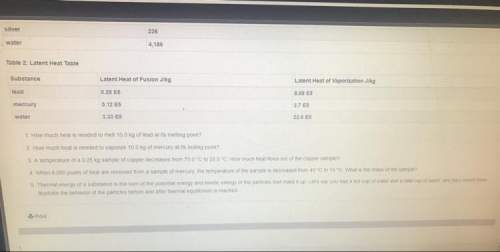
Physics, 24.06.2019 11:00, dianepowers1
The questions are 1. how much heat is needed to melt 10.0kg of lead at it’s melting point? 2. how much heat is needed to vaporize 10.0 kg of mercury at its boiling point? 3. a temperature of a 0.25 kg sample of copper decreases from 75.0 degrees celsius to 25.0 degrees celsius. how much heat flows out of the copper sample? 4. when 8,000 joules of heat are removed from a sample of mercury, the temperature of the sample is decreased from 40 degrees celsius to 15 degrees celsius. what is the mass of the sample? 5. thermal energy of a substance is the sum of the potential energy and kinetic energy of the particles that make it up. let’s say you had a hot cup of water and a cold cup of water, then mixed them. illustrate the behavior of the particles before and after thermal equilibrium is reached


Answers: 2
Other questions on the subject: Physics

Physics, 21.06.2019 14:10, mbonham481
Gam radio signals can usually be heard behind a hill, but fm often cannot. that is, am signals bend more than fm. explain. (radio signals, as we shall see, are carried by electromagnetic waves whose wavelength for am is typically 200 to 600 m and for fm about 3 m.)
Answers: 2

Physics, 21.06.2019 23:30, jacobc7698
Jessie ran 5000 meters from the cops and an average speed of 6 meters / second before he got caught . how long did he run?
Answers: 1

Physics, 22.06.2019 04:00, jaejaeJae9534
Acompound machine is also called a machine. a. force b. simple c. complex d. directional
Answers: 1

Physics, 22.06.2019 06:00, ayoismeisalex
Imagine that someone pushes one marble toward a motionless marble. would there still be action-reaction forces involved in the collision? how might the marbles’ motions be changed? ?
Answers: 1
Do you know the correct answer?
The questions are 1. how much heat is needed to melt 10.0kg of lead at it’s melting point? 2. how m...
Questions in other subjects:

Spanish, 15.04.2020 17:38


History, 15.04.2020 17:38

History, 15.04.2020 17:39

Mathematics, 15.04.2020 17:39



Social Studies, 15.04.2020 17:39

Health, 15.04.2020 17:39

Mathematics, 15.04.2020 17:39




 is the latent heat of fusion of the substance
is the latent heat of fusion of the substance (latent heat of fusion of lead)
(latent heat of fusion of lead)


 is the latent heat of vaporization of the substance
is the latent heat of vaporization of the substance (latent heat of vaporization of mercury)
(latent heat of vaporization of mercury)


 is the specific heat of copper
is the specific heat of copper is the change in temperature of the copper
is the change in temperature of the copper
 is the specific heat of mercury
is the specific heat of mercury is the change in temperature of the sample
is the change in temperature of the sample




